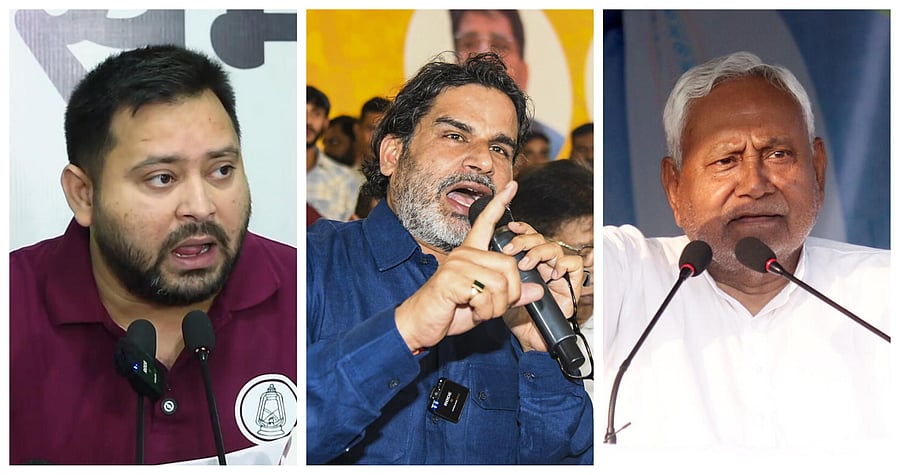
Tejashwi Yadav, Prashant Kishor and Nitish Kumar
Credit: PTI Photos
New Delhi: First, he liberalised the liquor policy when he became Chief Minister in 2005 to ramp up revenue for his government, but after 11 years, Nitish Kumar imposed prohibition in Bihar, which, his opponents claim, has led to hooch tragedies and indiscriminate arrest of Dalits and the underprivileged on charges of violating the law.
The Opposition I.N.D.I.A. bloc, in its manifesto, has promised to review the prohibition law and frame a fair policy, release all Dalit and unprivileged people who have been jailed and keep traditional liquor like toddy and mahua from the ambit of prohibition.
The Prashant Kishor-led Jan Suraaj Party wants the ban lifted entirely, while the ruling JD(U) is silent on the issue.
It was in April 2016 that Nitish, who was leading the government, implemented prohibition in the state despite reservations from the then coalition partner RJD, which also wanted exemption for toddy, arguing that it would impact the livelihood of the Pasi community, a Maha-Dalit community that accounts for nearly 12.88 lakh people in the State.
Nitish, who in 2005 brought in a liberalised policy — which allowed the opening of liquor shops in villages, among other things, and saw the excise duty collection rising from around Rs 500 crore to over Rs 3,000 crore in 2015-16 — initially planned a phase-wise implementation but later amended the prohibition policy to cover the entire State in a single stroke.
The decision reaffirmed Nitish’s women support base, which was on the rise with his control over law and order, as well as giving them political power through reservation in local bodies. Studies showed that instances of domestic violence came down significantly after the prohibition.
But the State finances took a hit, with excise duty collection nose-diving from Rs 3,142 crore in 2015-16 to less than Rs 40 crore in the next fiscal.
Since the prohibition was announced, reports indicated that there were 190 deaths in hooch tragedies, while 9.3 lakh prohibition cases were registered, in which around 14.3 lakh arrests were made. It is also claimed that nearly 35% of the arrests were of those from the other backward classes (OBCs), 27.1% of the Scheduled Castes (SCs) and 6.8% of the Scheduled Tribes (STs).
In the run-up to the Assembly elections, parties had been trying to woo the Pasi community by demanding lifting the ban on toddy, if not asking for a complete reversal of the prohibition policy. RJD’s Tejashwi Yadav was among the first to seek a reversal of the ban on toddy while recalling how former Chief Minister and his father Lalu Prasad had in the 1990s done away with tax on toddy.
NDA ally LJP (RV)’s Chirag Paswan had in May demanded that toddy be excluded from prohibition, calling it a “natural product” and it should not be categorised as alcohol.
Political commentator Amitabh Tiwari told DH that Bihar is one of the States with the lowest per capita income, and people spending a lot of money on liquor cannot be an argument for prohibition.
“If the prohibition policy is such a good policy, then shouldn’t it be adopted nationwide?... This is a larger debate as to whether prohibition should be of liquor or of social evils which emanate from the consumption of liquor. The two are different things. You are trying to solve something by banning liquor, then perhaps the root cause of it is not consumption of liquor,” he said.
